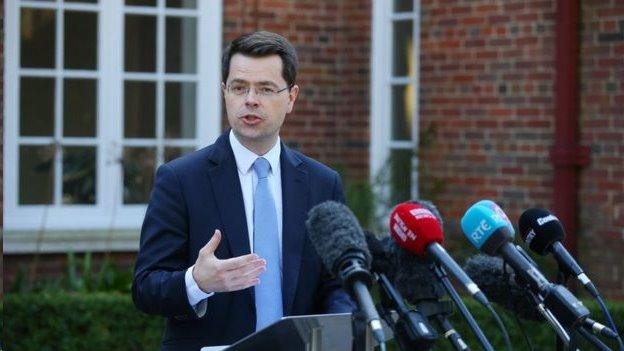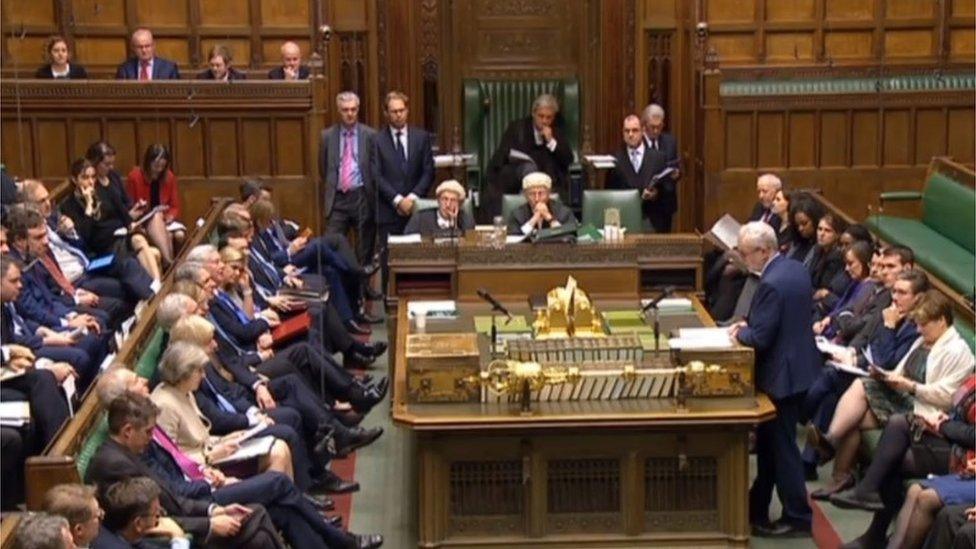Week ahead in Parliament
- Published
- comments
The end of the Parliamentary session involves a few odd actions and Norman French being spoken in Westminster
It's the last rites of the 2015 Parliament - and in a frenzy of last minute deal-making, the legislation which can be completed will be rushed to the finishing line, while all manner of bills and other parliamentary business is dropped for lack of time.
Watch out for plenty of brinkmanship, particularly on a key amendment to the Criminal Finances Bill (see below). This will also make the whole timetable pretty fluid and prone to last minute alteration as new events are crowbarred in.
A few of the MPs who are departing at this election may deliver their Commons swansongs - and the final PMQs could be a particularly bare-knuckle occasion.
Meanwhile, up on the committee corridor, it's raining reports, as the various select committees rush out the results of their inquiries - up to 50 more reports should be out before dissolution.
The subjects include: the Women and Equalities Committee on Building for Equality: Disability and the Built Environment, external; the Education Committee on Exiting the EU: challenges and opportunities for higher education, external; Scottish Affairs on Jobcentre Plus closures, external, and Public Accounts (which has quite a few offerings in the pipeline) on the HMRC Estate, external.
Monday

James Brokenshire is the Northern Ireland Secretary and is negotiating a new settlement with the parties in Northern Ireland
The Commons meets at 2.30 pm for Communities and Local Government questions - with any urgent questions or ministerial statements likely to be slotted in at 3.30pm.
The main event will be the rushing through of the Northern Ireland (Ministerial Appointments and Regional Rates) Bill,, external which is designed to keep the devolved system in place while the political parties on the Assembly negotiate to set up a new executive.
The adjournment led by the Conservative Richard Drax in on primates as pets - it will raise the issues highlighted in a petition of more than 110,000 signatures calling for new welfare standards for primates. This had been gathered by visitors to Monkey World, a primate rescue centre in Mr Drax's constituency, which calls for a change the law so that those who want to keep primates have to meet exacting standards of welfare that equal those found in zoos and wildlife parks.
In Westminster Hall (4.30pm) MPs debate e-petition 172405, external on closed book examinations for GCSE English Literature. The exams require students to learn and memorise as many as 250 quotations from 15 poems, two plays and a novella. The petition argues that the exams should not test the student's memory, but how they interpret texts. The petition has attracted 109,285 signatures.
The scheduled hearing of the Commons Liaison Committee, the super committee of select committee chairs with the prime minister, has been cancelled because of the election. They now aim to hold a hearing as soon as possible in the new parliament, but since the new set of chairs are unlikely to be in place before mid-July, that may not be before the summer recess.
In the Lords, business opens (2.30pm) with tributes to Sir David Beamish who has stood down as the top official of the House, the Clerk of the Parliaments (the Clerk of the Commons is "under-clerk") to be led by the Leader of the House, Baroness Evans.
And then peers move on to a series of orders and regulations, including the Trade Union (Deduction of Union Subscriptions from Wages in the Public Sector) Regulations 2017, the Immigration Act 2016 (Consequential Amendments) (Biometrics and Legal Aid) Regulations 2017, the Misuse of Drugs Act 1971 (Amendment) Order 2017 among others.
Then there is a short debate on the report 'Race in the workplace: The McGregor-Smith Review, external' - which calls for all employers with more than 50 people to set aspirational targets to increase diversity and inclusion throughout their organisations - not just at the bottom. Companies should look at the make-up of the area in which they are recruiting to establish the right target. For instance, the proportion of working age people from a BME background in London and Birmingham is already over 40%, with Manchester not far behind. Baroness McGregor-Smith chairs the Women's Business Council, a working group that seeks to maximise women's contribution to economic growth, and was appointed by the then Business Secretary Sajid Javid, to lead a review of the issues faced by businesses in developing black and minority ethnic talent from when they start work through to the executive level.
Tuesday
The Commons meets at 11.30am for Justice questions (watch out for fallout from the demise of the Prisons and Courts Bill, which has had to be scrapped because there is not enough time to get it through before the election) to be followed by a Ten Minute Rule Bill from Labour's Rachel Reeves.
This is on fees and charges to unauthorised overdrafts, which are often higher than those for the now capped payday loans - an issue she has pursued on the Treasury Select Committee. She wants the Financial Conduct Authority to introduce a cap on the charges to bring them into line with the cap on payday loans.
The day's main event is the committee of the whole House debate on the Finance (No. 2) Bill, external - which puts the measures announced in the Budget into effect - although the time pressure imposed by the election will probably mean controversial sections are stripped out. MPs will also debate Lords amendments to the Health Service Medical Supplies (Costs) Bill. , external
In Westminster Hall, there's a Backbench Business Committee debate on Post Office closures (9.30am- 11am), followed by a series of debates led by individual MPs: the Conservative former education secretary Nicky Morgan raises Police and local authority guidance on dogs attacking other dogs (11am- 1.30 am); the Conservative Derek Thomas has a debate on employment opportunities in food and farming (2.30pm- 4pm); the Conservative James Heappey discusses Wells' bid for UK City of Culture (4pm-4.30pm) and the Conservative David Mackintosh leads a debate on grandparents' rights to access to grandchildren (4.30pm -5.30pm).
In the Lords (2.30pm) peers bash their way through Commons amendments to the Technical and Further Education Bill, external, the Neighbourhood Planning Bill, external (there is now all-party consensus around an amendment to provide protection for pubs in the planning system), and the Bus Services Bill., external
Then comes the main event: the report stage and third reading of the Criminal Finances Bill , external- watch out for the cross party amendment in the names of the Crossbencher Baroness Stern, Labour's Lord Rosser, the Lib Dem Baroness Kramer and the Conservative Lord Kirkhope, to require a register of the beneficial ownership of companies based in UK overseas territories like Anguilla, Bermuda, the British Virgin Islands, the Cayman Islands, Montserrat and the Turks and Caicos Islands - which they argue will improve transparency and help clamp down on money laundering.
Finally, there is a short debate on support for the steel industry and its role in the government's industrial strategy led by Lord Mendelsohn.
Wednesday

The final PMQs of the 2015 Parliament could see the last confrontation between the party leaders before the poll
The Commons opens (11.30am) with Welsh questions, followed at noon by Prime Minister's questions - which, unless face to face TV debates are held, will be the only direct confrontation between Theresa May and her rivals before polling day.
Then comes a Ten Minute Rule Bill from the SNP's Alan Brown, who wants to end the use of cash retentions in the construction industry. This is where a proportion of a sub contract is held over by the main contractor to sort any defects on the job - but sub-contractors routinely fail to get their money back in a timely manner or sometimes not at all, sometimes because of the insolvency of main contractor. Mr Brown is proposing a scheme similar to the tenancy deposit scheme which will provide independent protection.
After that it's back to the washup, and consideration of Lords amendments to the Digital Economy Bill, external (issues in play include more superfast broadband, a proposed independent commission to set the BBC Licence Fee, a requirement that public service broadcasters are prominent on the channel displays of digital TV systems, and much much more), followed by Lords amendments to the Criminal Finances Bill (see above).
The adjournment led by Labour's Chris Evans is on the effect of diesel fumes in Islwyn - his constituency.
In Westminster Hall there are debates on school funding in the North East of England, led by Labour's Sharon Hodgson (9.30am -11am); the Colne to Skipton railway led by the Conservative Andrew Stephenson (11am - 11.30am) and learning outside the classroom, led by Labour's Barry Sheerman (4pm- 4.30pm).
In the Lords (3pm) questions include the Green peer Baroness Jones of Moulsecoomb on refining the definition of domestic extremism to enable the police to focus on those involved in terrorism and serious crime - she used the Data Protection Act to access her police file, and found she was considered a potential extremist, and had been under surveillance by the police's "domestic extremism" unit from 2001 until 2012, including during her candidacy to become London's mayor.
She is still pressing for answers about the surveillance and the alleged destruction of documents on her case.
Then peers zoom through the remaining private members' bills sent over by the Commons - starting with the committee stage of the Local Audit (Public Access to Documents) Bill, followed by the Merchant Shipping (Homosexual Conduct) Bill and the Guardianship (Missing Persons) Bill - and the Farriers (Registration) Bill. All will have their third reading debates the next day.
Thursday
In the Commons, MPs open (9.30am) with Exiting the European Union questions, followed by any remaining loose legislative ends sent over by their lordships. There may or may not be any.
And the final debate of the 2015 Parliament will be the SNP MP Chris Stephens' adjournment on the cost of telephone calls to the Department for Work and Pensions.
In the Lords (from 11am) questions to ministers include the Conservative, Baroness Couttie, the Leader of Westminster City Council, calling for legislation to regulate pedicab drivers. Then peers will move on to those third reading debates - on the Local Audit (Public Access to Documents) Bill, the Merchant Shipping (Homosexual Conduct) Bill, the Guardianship (Missing Persons) Bill and the Farriers (Registration) Bill.
And their final task will be to approve some statutory instruments on Driving Disqualifications and Student Fees, Awards and Support- although that last one comes with a regret motion attached, from Labour's Lord Clark of Windermere. So it is possible that the final act of the House of Lords in this Parliament might be to defeat the government.
And when all is done, the mildly pythonesque ceremony of prorogation will follow, with much doffing of cocked hats and flowery cod-medieval language.
Some MPs, mostly those who're not seeking re-election, usually come to the bar of the House to watch the spectacle.
And that will be it until Parliament reconvenes after the election, On 3 May (following dissolution at 00:01 BST that morning) a meeting of the Privy Council will issue a proclamation to declare the meeting of the new Parliament with 14 June the likely date.
The only business at the meeting will be to elect a Speaker. The next day the anointed Speaker will receive the Royal Approbation, and this will allow MPs and peers start to swear the Oath of Allegiance. This continues until Friday. New MPs then have the chance to go on various induction courses and are allocated offices.
My bet is that 21 June will see the state opening, with the government's plans for the coming session announced.